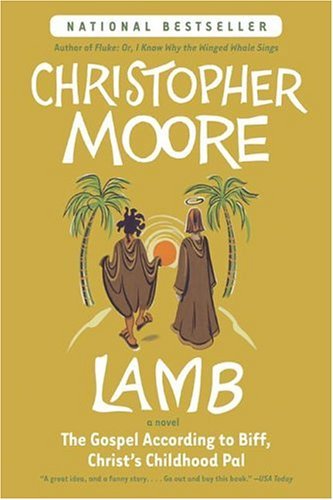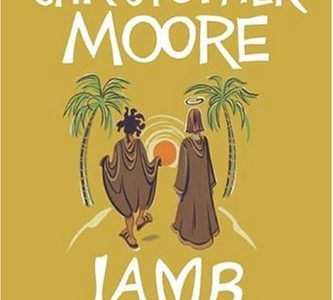
I love to read anything that captures the heart of young men and women, especially when the church speaks out against that same literature. For me, these are opportunities to gain insight into the gaps between what I believe and my ability to effectively understand and communicate with the next generation. This fascination has led me to embrace many wonderful, modern works like Harry Potter and The Golden Compass.
I recently had lunch with a 20 something self-proclaimed atheistic leaning agnostic. Our conversation covered school, business, music, health and culture. I was greatly intrigued with his view of the world and its values. A lifetime of education, experience and pain had been amazingly crammed into his just post-teen frame. This left me especially excited to find the answer to a question I often ask – “What is your favorite book of all time?”
His answer was quick and definite, “Lamb, by Christopher Moore.”
Not only had I not read the book, I had never heard of the book. After lunch, I quickly purchased an electronic copy and gained new insights into the critical thinking of our up-and-coming elect.
Lamb, subtitled The Gospel According to Biff, Christ’s Childhood Pal, covers a period the New Testament gospels left out. In our Bibles, we get but one brief insight into the life of Jesus between his preschool years and young 30’s. Lamb fills in the gaps.
Joshua (Jesus) and his pal Biff start off with fairly normal lives for their time where each is destined to follow in the footsteps of his father’s vocation. Joshua knows he is different. He comes to believe he is the son of God. This most likely means he is supposed to be the prophesied messiah; however, he has no idea how to go about it. When no insights come through prayer or their immediate relationships, Joshua and Biff decide to go looking for answers; and what better place to find answers than to track down the 3 wise men who had showed up at Joshua’s birth.
Over the next 16 years Joshua and Biff take a journey gaining insights into purpose and hints at the meaning of life. We meet many outstanding characters along the way, but the three highlights and lengthiest stopping points are with the wise men they eventually find.
In the stone home of Balthasar, our heroes learn much of Tao and the secrets of the apothecary. While most magic is rationally understood, we come to realize that there is still so much more as the two face and eventually conquer a literal demon.
Having unleashed and defeated a demon the two make their way to a monastery where we meet Gaspar. After painstakingly proving their worth and gaining admittance, Joshua and Biff learn and practice, and practice and practice the essential Buddhist traditions of complete meditation and kung fu. Their adventures as monks ultimately lead to absolute control over their minds and bodies. Interestingly, they also gain insight into the nature of man and history of the world through their encounters with the last Yeti.
From the communion of silence the expedition heads toward the isolation of Hinduism where we encounter Melchoir, a true yogi. Whereas Buddhist meditation lends toward focused thinking, Hinduistic meditation seeks absolute and pure emptiness; emptiness of thought, want and self in the form of ultimately achieving out-of-body experience. Yoga is an important practice. Upon emptying one’s self, it is possible to find the power within. This Divine Spark is truly powerful and, upon removing all the buffers of life, accessible. The Divine Spark is somewhat like the modern equivalent of the Force from Star Wars. Joshua later translates this to the more palatable for Jewish tradition Holy Spirit.
In Lamb, we find the Jewish son of God drawing from all great philosophies and belief systems of the world to become the messiah. These diverse structures come together in the man who willingly sacrifices himself and begins the perfected melting pot of religious thought – Christianity.
After completing the book, I continue to ponder its meaning for me. I have gained deeper discernment into the minds of a completely interconnected youth where the Bible belt seems a little too tight and other lines of thinking are readily accessible to those willing to seek. I still need to think, pray and perhaps meditate on what I can take away from this and how to most effectively communicate love and understanding to a highly intellectual generation facing questions and answers I never even had the insight to struggle with.
Here are a few of my favorite quotes from the book:
God is a comedian playing to an audience who is afraid to laugh.
Voltaire
I don’t know if now, having lived and died the life of a man, I can write about little-boy love, but remembering it now, it seems the cleanest pain I’ve known. Love without desire, or conditions, or limits – a pure and radiant glow in the heart that could make me giddy and sad and glorious all at once.
Biff
God is willing to forgive you the sin you carry for being a child of man, but you must forgive yourself for having once been a child.
Joshua
If the wise man always appears stupid, his failures do not disappoint, and his successes give pleasant surprise.
Biff
Mankind, I suppose, is designed to run on – to be motivated by – temptation. If progress is a virtue then this is our greatest gift. (For what is curiosity if not intellectual temptation? And what progress is there without curiosity?)
Biff
A question asked in earnest deserves an earnest answer.
Balthasar
That’s the difference between irony and sarcasm. Irony can be spontaneous, while sarcasm requires volition. You have to create sarcasm.
Biff
The three jewels of Tao: compassion, moderation and humility – compassion leads to courage, moderation leads to generosity, and humility leads to leadership.
Balthasar
One can’t be free without action.
Joshua
Change comes through action. There’s no such thing as a conservative hero.
Balthasar
All fear comes from trying to see the future. If you know what is coming, you aren’t afraid.
Joshua
Love is not something you think about, it is a state in which you dwell. That is a gift.
Joshua
A man’s self does not change, only his body.
Melchoir
Faith isn’t an act of intelligence, it’s an act of imagination.
Maggie
Nobody’s perfect… Well, there was this one guy, but we killed him.
Unknown

